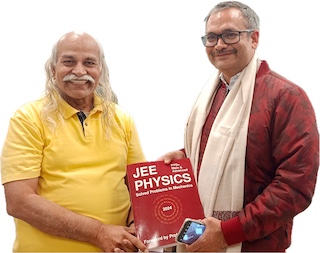Second Law of Thermodynamics
The Second Law of Thermodynamics states that the total entropy of an isolated system will always increase with time. The second law is usually stated as Kelvin-Plank or Clausius statements:
Kelvin Plank Statement: No process is possible whose sole result is the absorption of heat from a reservoir and the complete conversion of the heat into work.
Clausius Statement: No process is possible whose sole result is the transfer of heat from a colder object to a hotter object.
One of the key implications of the law is that heat naturally flows from hotter objects to colder objects. Another important consequence of the Second Law is that no system can have a thermal efficiency of 100%
Problem from IIT JEE
Problem (JEE Mains 2021): An ideal gas in a cylinder is separated by a piston in such a way that the entropy of one part is $S_1$ and that of the other part is $S_2$. Given that $S_1 > S_2$. If the piston is removed then the total entropy of the system will be
- $S_1S_2$
- $S_1-S_2$
- $S_1+S_2$
- $S_1/S_2$
Problem (JEE Mains 2021):
Statement 1: Second law of thermodynamics is derived from the fact that it is impossible to run an irreversible engine without aid of external agency.
Statement 2: Second law of thermodynamics provides the concept of entropy.
- Both statement 1 and 2 are correct.
- Both statement 1 and 2 are incorrect.
- Statement 1 is correct but statement 2 is incorrect.
- Statement 1 is incorrect but statement 2 is correct.
Problem (JEE Mains 2015): A solid body of constant heat capacity 1 J/℃ is being heated by keeping it in contact with reservoirs in two ways
- Sequentially keeping in contact with 2 reservoirs such that each reservoir supplies same amount of heat.
- Sequentially keeping in contact with 8 reservoirs such that each reservoir supplies same amount of heat.
- $\ln 2$, $4\ln 2$
- $\ln 2$, $\ln 2$
- $\ln 2$, $2\ln 2$
- $2\ln 2$, $8\ln 2$
Problem (JEE Mains 2003): "Heat cannot by itself flow from a body at lower temperature to a body at higher temperature" is a statement or consequence of
- second law of thermodynamics
- conservation of momentum
- conservation of energy
- first law of thermodynamics
